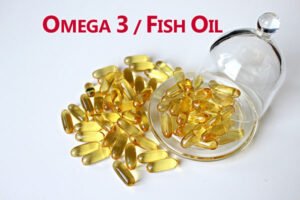

Multiple studies indicate that taking daily glucosamine sulfate supplements may offer effective, long-term treatment for OA by significantly reducing pain, helping maintain joint space, and slowing disease progression ( 9, 10, 11, 12). This molecule has been well-studied for its potential to treat symptoms and disease progression associated with osteoarthritis (OA), rheumatoid arthritis (RA), and osteoporosis. Most scientific research on glucosamine has focused on the use of one specific form called glucosamine sulfate. Glucosamine supplements are frequently taken to treat various bone and joint conditions.

Often used to treat bone and joint disorders While more studies are necessary, some research indicates that glucosamine supplements may protect your joints from damage. Glucosamine helps develop tissues that are crucial for proper joint function. These results suggest a joint-protective effect of glucosamine.
Omega 3 side effects professional#
Some studies indicate that taking glucosamine supplements may protect joint tissue by preventing the breakdown of cartilage, particularly in athletes.įor example, one study demonstrated that taking 1.5–3 grams of glucosamine daily for 3 months significantly decreased cartilage breakdown in collegiate soccer players and professional rugby players ( 8). More specifically, it is thought that glucosamine promotes the creation of certain chemical compounds, including collagen, that are important structural components of articular cartilage and synovial fluid.

One of its main roles is to support the healthy development of articular cartilage, a type of smooth white tissue that covers the ends of your bones where they meet to form joints ( 7).Īlong with the lubricating liquid called synovial fluid, articular cartilage minimizes friction and allows bones to move freely and painlessly across one another. Glucosamine exists naturally in your body ( 1). Still, more research is needed on the topic. Some research indicates that glucosamine may reduce inflammation, especially when used alongside chondroitin supplements. Still, more research is needed to better understand how glucosamine may help reduce inflammation in your body. Interestingly, glucosamine’s anti-inflammatory effects have also has been associated with a lower risk of developing conditions mediated by inflammation, like type 2 diabetes ( 6). These cells are responsible for producing synovial fluid components, or joint fluid ( 5). That being said, glucosamine and chondroitin have been shown to inhibit the activation of inflammatory pathways in human synovial cells. It’s also involved in your body’s production and maintenance of healthy cartilage.Īlthough glucosamine and chondroitin have been shown to lower systematic inflammation, it’s unknown whether they have any localized anti-inflammatory effects. Like most other research on glucosamine, this study simultaneously supplemented with chondroitin, a compound similar to glucosamine.
Omega 3 side effects plus#
In a small study in 18 adults with overweight, taking 1,500 mg of glucosamine hydrochloride plus 1,200 mg of chondroitin sulfate daily for 28 days lowered C-reactive protein (CRP) - a biomarker of systematic inflammation - by 23% compared with placebo ( 4). Though glucosamine’s mechanisms are still poorly understood, it appears to readily reduce inflammation. Glucosamine is often used as a supplement to treat symptoms of various inflammatory conditions.


 0 kommentar(er)
0 kommentar(er)
